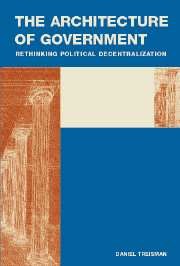Book contents
- Frontmatter
- Contents
- List of Figures and Tables
- Preface
- Glossary of Main Notation Used
- 1 INTRODUCTION
- 2 THE POLITICAL PROCESS
- 3 ADMINISTRATIVE EFFICIENCY
- 4 COMPETITION AMONG GOVERNMENTS
- 5 FISCAL POLICY AND REDISTRIBUTION
- 6 FISCAL COORDINATION AND INCENTIVES
- 7 CITIZENS AND GOVERNMENT
- 8 CHECKS, BALANCES, AND FREEDOM
- 9 ACQUIRING AND USING KNOWLEDGE
- 10 ETHNIC CONFLICT AND SECESSION
- 11 DATA TO THE RESCUE?
- 12 CONCLUSION: RETHINKING DECENTRALIZATION
- References
- Index
- Titles in the series
8 - CHECKS, BALANCES, AND FREEDOM
Published online by Cambridge University Press: 05 June 2012
- Frontmatter
- Contents
- List of Figures and Tables
- Preface
- Glossary of Main Notation Used
- 1 INTRODUCTION
- 2 THE POLITICAL PROCESS
- 3 ADMINISTRATIVE EFFICIENCY
- 4 COMPETITION AMONG GOVERNMENTS
- 5 FISCAL POLICY AND REDISTRIBUTION
- 6 FISCAL COORDINATION AND INCENTIVES
- 7 CITIZENS AND GOVERNMENT
- 8 CHECKS, BALANCES, AND FREEDOM
- 9 ACQUIRING AND USING KNOWLEDGE
- 10 ETHNIC CONFLICT AND SECESSION
- 11 DATA TO THE RESCUE?
- 12 CONCLUSION: RETHINKING DECENTRALIZATION
- References
- Index
- Titles in the series
Summary
But from the point of view of the real, the historical roots of liberal democracy, freedom has rested … upon the diversification and the decentralization of power in society. In the division of authority and the multiplication of its sources lie the most enduring conditions of freedom.
Robert Nisbet (1962, pp. 269–70)Clearly … in the United States, the main effect of federalism since the Civil War has been to perpetuate racism … the claim of the ideologists of federalism that the system strengthens freedom is … false.
William Riker (1975, pp. 154–7)One common defense of decentralization is that it helps to protect individual freedom. Advocates make two main arguments to this effect. The first concerns misbehavior by the national government. Under decentralization, powerful local or regional governments can defend individuals against abuses by a central ruler. The second argument concerns misbehavior by local governments. If local officials persecute citizens, the latter can escape by moving to other localities. Because international migration is more costly or difficult, the corresponding safeguard against central government persecution is weaker. I examine both these arguments. The first seems less than compelling because, as Riker points out and as the second argument assumes, what local governments preserve may not be freedom. It may just as well be slavery, indentured servitude, or the abuse of women, children, or ethnic minorities. As for the mobility argument, it requires that local rulers allow their victims to leave.
- Type
- Chapter
- Information
- The Architecture of GovernmentRethinking Political Decentralization, pp. 193 - 208Publisher: Cambridge University PressPrint publication year: 2007



